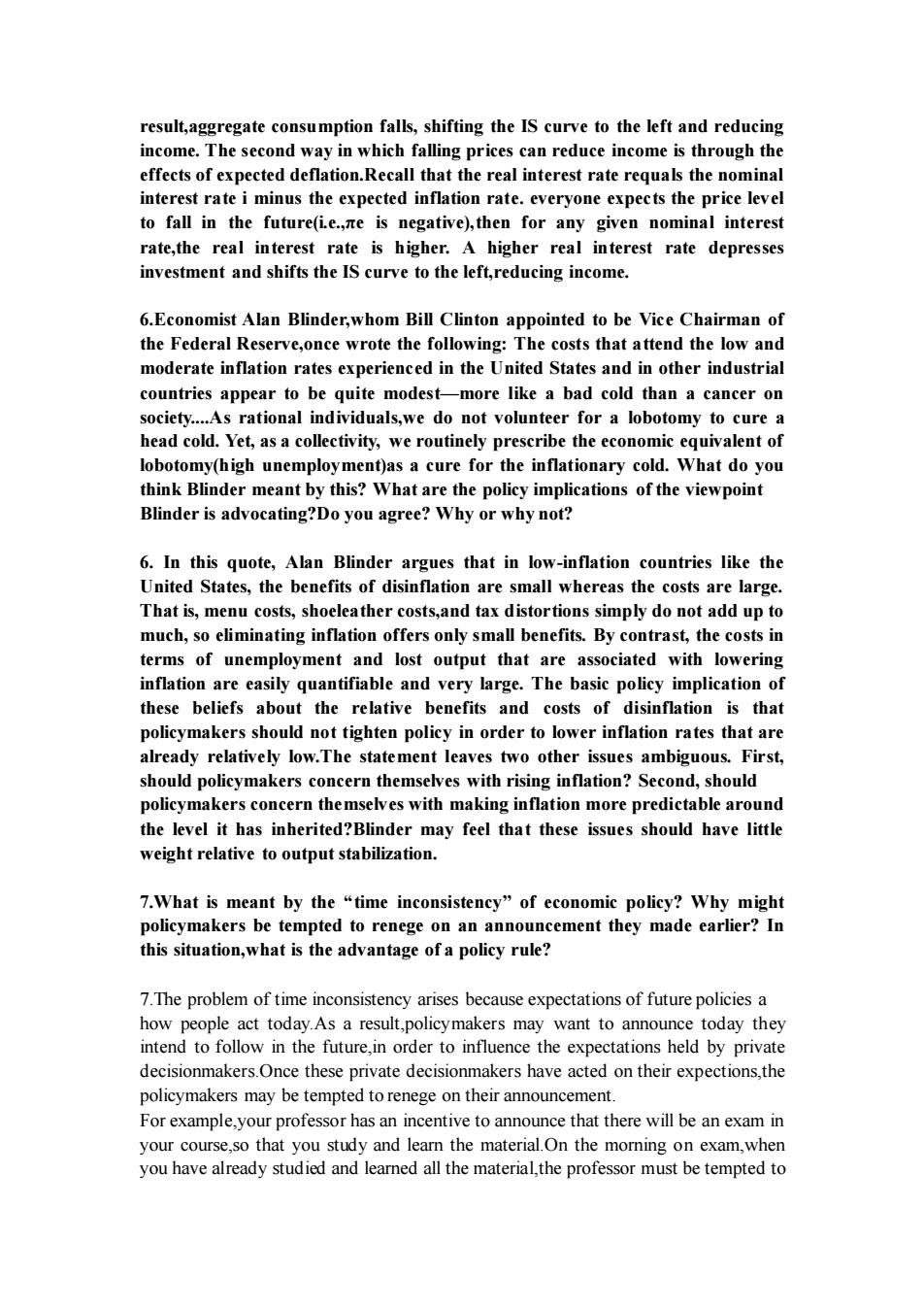正在加载图片...

effects of expected deflation.Recall that the real interest rate requals the nominal interest rate i minus the expected inflation rate.everyone expects the price level to fall in the future(ie.,ne is negative),then for any given nominal interest rate,the real interest rate is higher.A higher real interest rate depresses investment and shifts the IS curve to the left,reducing income 6.Economist Alan Blinder,whom Bill Clinton appointed to be Vice Chairman of the Federal Reserve,once wrote the following:The costs that attend the low and moderate inflation rates experienced in the United States and in other industrial countries appear to he quite modest more like a bad cold than a cancer on society. As rational uals,we do not volunteer for a lobotomy to cure a head cold.Yet,as a collectivity,we routinely prescribe the economic equivalent of lobotomy(high unemployment)as a cure for the inflationary cold.What do you think Blinder meant by this?What are the policy implications of the viewpoint Blinder is advocating?Do you agree?Why or why not? 6.In this quote,Alan Blinder argues that in low-inflation countries like the United States,the benefits of disinflation are small whereas the costs are large. That is,menu costs,shoeleather costs,and tax distortions simply do not add up to much,so eliminating inflation offers only small benefits.By contrast,the costs in terms of unem loyment and lost outp ociated with erin inflation are easily quantifiable and very large.The basic policy implication of these beliefs about the relative benefits and costs of disinflation is that policymakers should not tighten policy in order to lower inflation rates that are already relatively low.The statement leaves two other issues ambiguous.First. should policymaker on ern themselves with risine gi nation?Sco ond,should ern the mselves with making inflation more predictable aro the level it has inherited?Blinder may feel that these issues should have little weight relative to output stabilization. 7.What is meant by the "time inconsistency"of economie policy?Why might he t ym ted renege cemen they m ade earlier?In situation,what is the advantage of a policy rule? 7 The problem of time inconsistency arises because expectations of future policies a how people act today.As a result,policymakers may want to announce today they intend to follow in the future ir der to influence the expe ectations held by decisionmakers e these private decisionmakers have acted on their expections,the policymakers may be tempted to renege on their announcement For example,your professor has an incentive to announce that there will be an exam in your course.so that you study and learn the material.On the morning on exam,when you have already studied and leared all the materialthe professor must be tempted toresult,aggregate consumption falls, shifting the IS curve to the left and reducing income. The second way in which falling prices can reduce income is through the effects of expected deflation.Recall that the real interest rate requals the nominal interest rate i minus the expected inflation rate. everyone expects the price level to fall in the future(i.e.,πe is negative),then for any given nominal interest rate,the real interest rate is higher. A higher real interest rate depresses investment and shifts the IS curve to the left,reducing income. 6.Economist Alan Blinder,whom Bill Clinton appointed to be Vice Chairman of the Federal Reserve,once wrote the following: The costs that attend the low and moderate inflation rates experienced in the United States and in other industrial countries appear to be quite modest—more like a bad cold than a cancer on society.As rational individuals,we do not volunteer for a lobotomy to cure a head cold. Yet, as a collectivity, we routinely prescribe the economic equivalent of lobotomy(high unemployment)as a cure for the inflationary cold. What do you think Blinder meant by this? What are the policy implications of the viewpoint Blinder is advocating?Do you agree? Why or why not? 6. In this quote, Alan Blinder argues that in low-inflation countries like the United States, the benefits of disinflation are small whereas the costs are large. That is, menu costs, shoeleather costs,and tax distortions simply do not add up to much, so eliminating inflation offers only small benefits. By contrast, the costs in terms of unemployment and lost output that are associated with lowering inflation are easily quantifiable and very large. The basic policy implication of these beliefs about the relative benefits and costs of disinflation is that policymakers should not tighten policy in order to lower inflation rates that are already relatively low.The statement leaves two other issues ambiguous. First, should policymakers concern themselves with rising inflation? Second, should policymakers concern themselves with making inflation more predictable around the level it has inherited?Blinder may feel that these issues should have little weight relative to output stabilization. 7.What is meant by the “time inconsistency’’ of economic policy? Why might policymakers be tempted to renege on an announcement they made earlier? In this situation,what is the advantage of a policy rule? 7.The problem of time inconsistency arises because expectations of future policies a how people act today.As a result,policymakers may want to announce today they intend to follow in the future,in order to influence the expectations held by private decisionmakers.Once these private decisionmakers have acted on their expections,the policymakers may be tempted to renege on their announcement. For example,your professor has an incentive to announce that there will be an exam in your course,so that you study and learn the material.On the morning on exam,when you have already studied and learned all the material,the professor must be tempted to